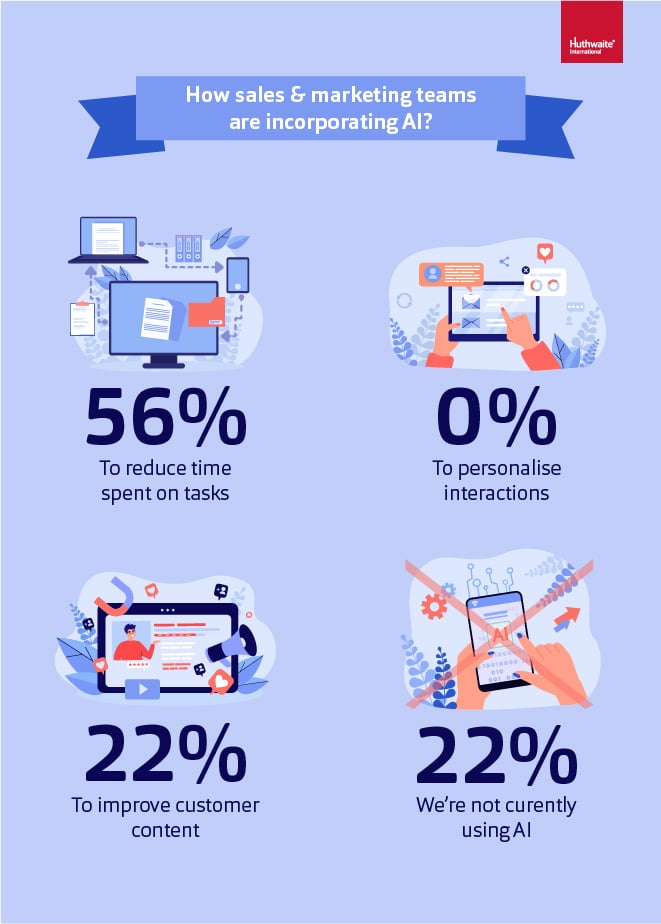Unless you’ve been living in a hole, you'll see the world is buzzing with the rapid evolution of AI. For Marketers, it’s unavoidable to be discussing AI and how it’s affecting and shaping our world.
Many marketers may be feeling uncomfortable and a little threatened when thinking about AI and their role, while others are embracing the change and allowing AI to take over some of the more laborious and repetitive tasks.
In order to uncover and understand how teams are using AI for marketing and sales, we started a LinkedIn poll to delve a little deeper to uncover how, as marketers, we’re engaging with this new technology.
Our LinkedIn poll
In the poll on Huthwaite’s LinkedIn page, 22% of respondents said they’re not using AI at all. Surprising, considering the exponential growth we’ve seen on the AI front across most business functions, but especially Marketing. Maybe they’re happy with current results – if they feel like what they’re doing is working, why change? And if they’re not early adopters, it could simply be that they haven’t been given the opportunity to give AI a go. Some businesses are reluctant to invest in AI, or if they are investing, they might not be investing time and money into training employees to actually use it.
Another 22% said they’re using AI-generated marketing content, which includes things like blogs, social content and copy for ads (among other things). AI can pull information quickly, meaning writing outlines and draft blogs can take seconds, in comparison to the hours of work it can take to create them from scratch.
But – and this is important to note – AI-generated content isn’t always so great (sorry, not sorry). We’ve all seen AI-generated images/videos and know, without a doubt, its origin (I’m thinking of extra or odd-looking fingers/arms/legs), and the same goes with written content. Trained writers can spot it a mile away, and often, so can your customers.
As a writer and marketer, I think it can be great for some initial inspiration and can significantly reduce the time it takes to put together an outline, but I don’t always love the full output or trust it wholeheartedly – and neither should you.
The whole idea is to curate strong, customer-centric messaging that interests and resonates with your target audience in order to convert them from viewers to leads. In order to do this, you need to understand where your customer is on the Buying Cycle, so you can create persuasive collateral for the sales team to move them down the sales funnel. This is something we teach throughout our SPIN Marketing programme, if you're interested!
Coming back to AI, though, as our Head of Learning and Innovation, Robin Hoyle, says: “Garbage in, garbage out”. AI outputs are wholly dependent on the prompts you give. It will pull from the same sources until a new source is added, meaning if your prompts are basic and uninspired, you’ll get the same “garbage” out, and your blog/content/ads/insert other content will miss authenticity and personality and, crucially, the specific and well-crafted messages that will resonate with your particular audience.
Finally, we asked how many people used AI to save time on repetitive tasks, and 56% of people agreed that this was their main reason for using AI within their role. But what does this mean?
Every job has repetitive tasks that need to be done day in and day out. AI can, and does, help with this to some extent.
Automated emails responding to enquiries? Check.
Analysing data to look for trends? Check.
Taking notes for you in meetings? Check.
There’s an array of boring and time-consuming tasks that AI can help with, which then means your time is freed up to work on more things that really matter and that humans are better at, like having great customer conversations or planning and producing a marketing strategy and related tactics.

AI & marketing – the wider picture
Now, a simple poll is only the tip of the iceberg. To truly understand the impact of AI in marketing, we’ve looked at more data to see how and when marketers are using it.
According to Hubspot, 48% of respondents to their survey stated they use AI to conduct research. While Google (other search engines are available) used to be the go-to to find out information, many more people are turning to AI to do the research for them. In just one or two prompts, the AI can literally trawl ‘the internet’ in its entirety to find the information you’re looking for, which it will then condense and summarise into nice, neat little packages for you to review. Again, saving you plenty of time.
Create customer-focused, persuasive sales collateral using SPIN®! Learn more about SPIN® Marketing
Hubspot also claims that AI and automation tools are saving marketing teams approximately 12.5 hours a week or 25-26 additional working days a year, which is a substantial amount of time that can be better used elsewhere.
Sticking with Hubspot, 84% of marketers surveyed said that AI is extremely effective at aligning web content with user search intent, as well as 80% of people claiming it improves user experience on their site. So, overall, AI is great at the basic, underlying tasks that are commonplace in the marketing world. But, I think it’s important to reiterate the importance of human skill, connection and communication to ensure content becomes more interesting and relevant to your prospects and customers.
While AI is great at working alongside marketers in the back end, the front end is a little trickier to master. In fact, Surveymonkey conducted some research and found that 64% of people preferred communicating with a person over a chatbot, with the reasons being that humans understand a customer’s needs better and that they’re less likely to become frustrated with a human. We all know – speaking to automated “people” to try and speak to an actual human can cause endless frustration.
On the other hand, 41% of respondents claimed that AI has better availability (obviously) and 37% believe it addresses issues faster. It’s hard to argue with these points, as it’s clear that a computer is always going to be able to work faster than a human, but which is more important – speed or human connection and understanding?
Key thoughts
Ultimately, this is where the problem lies. AI isn’t going anywhere, but it’s important to remember how collaboration with our human counterparts is and how important human connection is to the end user. Customers want to speak to you, your brand and your organisation.
So, while AI undoubtedly offers invaluable tools and insights for marketers, the human connection remains indispensable in creating authentic, meaningful experiences that resonate with audiences and it’s the human touch that will drive long-term success in your marketing efforts.







.jpg)